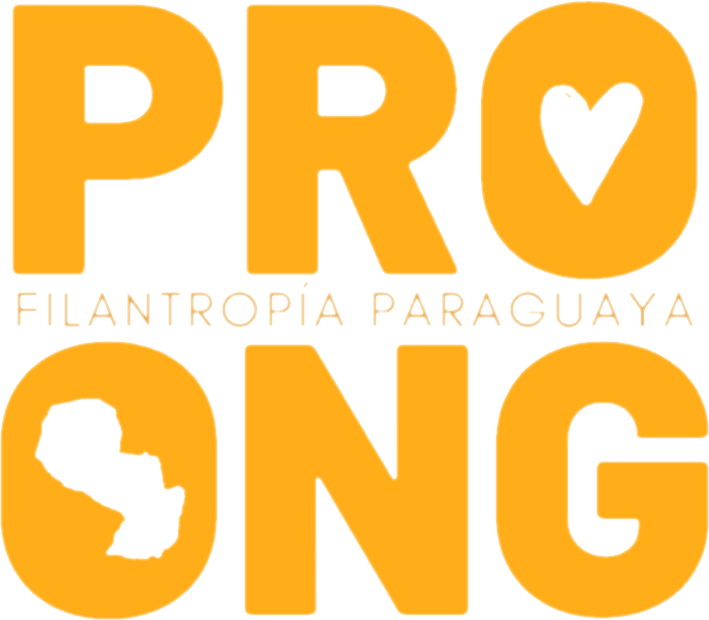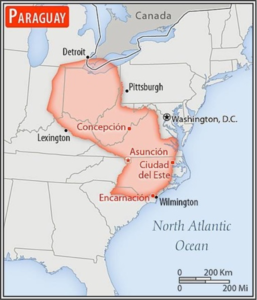
Paraguay NGOs and Nonprofits
If you are looking for someone to assist with the selection of a nonprofit partner in Paraguay or general guidance in paraguayan civil society, feel free to contact the founder of PRO ONG, Delbert Warkentin via email ong[@]ong.com.py or through one of the social media accounts below.
Profile
Paraguay falls below the Latin American average in several socioeconomic categories, including immunization rates, potable water, sanitation, and secondary school enrollment, and has greater rates of income inequality and child and maternal mortality. Paraguay’s poverty rate has declined in recent years but remains high, especially in rural areas, with more than a third of the population below the poverty line. However, the well-being of the poor in many regions has improved in terms of housing quality and access to clean water, telephone service, and electricity. The fertility rate continues to drop, declining sharply from an average 4.3 births per woman in the late 1990s to about 2 in 2013, as a result of the greater educational attainment of women, increased use of contraception, and a desire for smaller families among young women.[1]
Demographics
Population: 7.3 million
Life expectancy: 78.3 years
Infant mortality rate: 23.21 deaths/1,000 live births
Area: 406,752 sq km (about three times the size of New York state; slightly smaller than California)
Civil Society in Paraguay
Paraguay’s civil society is relatively young. Although there have been active nonprofits before and during the Stroessner dictatorship from 1954-1989, most current and active nonprofits have been created in the new democratic era of Paraguay. This is why there is still lot’s of opportunity for the third sector to grow and become of vital importance in Paraguayan society as it is much needed. This website “PRO ONG” started with one question: “How many nonprofits are there in Paraguay?” which was followed by, “How many work in education, healthcare, development, etc?” These questions asked by then candidate of Masters degree in Nonprofit Management at Columbia University, Delbert Warkentin, led to him creating this website for the general public and more specifically for civil society in Paraguay. The slogan that has been guiding this project from the start, “Be better at doing good” has been a phrase that keeps this project moving forward one step at a time.
According to data in PRO ONG, there are approximately 780 registered nonprofits. Of those, 400 have a public profile to some degree.
[1] https://www.cia.gov/the-world-factbook/countries/paraguay/
Explore Paraguayan nonprofits by categories:
If you are looking for someone to assist with the selection of a nonprofit partner in Paraguay or general guidance in paraguayan civil society, feel free to contact the founder of PRO ONG, Delbert Warkentin via email ong[@]ong.com.py or through one of the social media accounts below.
Causes to support in Paraguay
Learn more about specific causes in Paraguay that you can get involved in.
Poverty
Approximately 22% of the population of Paraguayans live below the poverty line, but nearly half of the population will be at risk of poverty during their lifetimes. Rural areas suffer from poverty most acutely, with some rural areas experiencing poverty rates of over 50%. Paraguay is also one of the most food-insecure countries in Latin America, and over 25% of the population suffers from malnutrition.
Education
Over 50% of children in Paraguay do not complete secondary education, and the country has one of the lowest secondary school attendance rates in Latin America. Approximately 10% of Paraguayan students, mainly those in rural areas, do not have access to educational facilities or any way of attaining formal education.
Clean Water
Overall, roughly 98% of the population has access to improved water sources. The discrepancy is in the rural areas where 95% have clean water. Furthermore, only 88% of individuals have access to sanitation facilities. Rural areas are at a distinct disadvantage for access to clean water, and some rural communities have decided to manage their own water supplies. Especially during dry seasons, villages can face dangerously low amounts of water that are not sufficient to sustain their populations.
Health
Reforms starting in 2008 provided government subsidies to cover basic health care costs for Paraguayans, but the healthcare sector lacks necessary funding and resources to carry out universal health care measures. The country currently suffers from a shortage of equipped facilities, and there are only about 1,000 hospitals and clinics in all of Paraguay. The low amount of health facilities makes care inaccessible to some, especially for specialized procedures. Cardiovascular disease, cancer, and other non-communicable diseases remain the leading causes of death.
Children
Paraguay is one of the poorest countries in Latin America, with roughly 22% of the population living in poverty. Paraguay has a very young population, and 25% of the population is under the age of 14. Nearly 150,000 Paraguayan children grow up as orphans. Children face frequent health problems, limited educational opportunities, and are forced to become wage earners at a young age. Internal and international traffickers prey upon vulnerable children begging on the street or otherwise take advantage of those looking to help support their families. Additionally, child labor is widespread in the country and approximately 10% of all children ages 10 to 14 are involved in the labor force. The majority work in agriculture and the rest in services such as street vending.
Government
The Paraguayan justice system is tainted by corruption and its impartiality is frequently questioned. The rule of law is rarely upheld with efficiency, and high-ranking officials allegedly guilty of crimes rarely receive punishment for wrongdoing. Court cases are not dealt with in a timely manner, making it difficult for citizens to receive justice. The violation of the rights of indigenous populations by the government is of concern as well. The Paraguayan government has frequently unjustly seized lands or denied indigenous populations rights to their traditional lands. Corruption in the judicial and law enforcement systems make foreign investors less likely to want to be involved in businesses in Paraguay.
Environment
Deforestation is a pressing environmental concern in Paraguay. Forests have been cleared so that land may be used for agriculture and urban development, but in the process Paraguay has lost precious natural resources and biodiversity. Paraguay consistently loses over 100,000 hectares per year due to subsistence farming and ranching. The country relies completely on hydropower for electricity. Additionally, Paraguay is one of only two landlocked countries in South America.
Animals
Paraguay is home to a wide variety of wildlife. Some species of rare birds that were thought to be extinct were discovered in the Chaco forest region as recently as the 1970s. Other species, such as parrots and macaws, are endangered because of illegal trade. Armadillos, snakes, and iguanas are also at risk because of the trade value of their skins.
Family
Nearly 20% of women in Paraguay ages 15 to 44 living with spouses or partners experience physical violence, and over 7% report sexual violence. Additionally, 78,000 women in the country between the ages of 15 and 44 were raped in one year alone. Inefficiency in the judicial system makes it difficult for abused women to receive proper protection and justice. Child marriage is also a problem in the country, with 18% of girls married before age 18.
Human Rights
The largest human rights violations in Paraguay are related to institutional corruption and the rights of minority or indigenous groups. The Paraguayan justice system is tainted by corruption and its impartiality is frequently questioned when high ranking officials guilty of crimes rarely receive punishment for wrongdoing. The land rights of low-income and indigenous populations have not been respected, as hundreds have been forced from their homes to make room for power plant construction. Domestic abuse is a rampant concern in Paraguay. Nearly 20% of women in Paraguay ages 15 to 44 living with spouses or partners experience physical violence and over 7% report sexual violence.